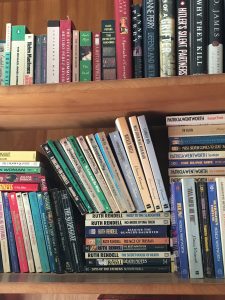My mom got me started reading mysteries early. My first Agatha Christie was ‘Death Comes as the End.’ I picked it up during my early mummy hunting phase because it is set in ancient Egypt. At that time I wanted to be a writer AND an archeologist. The latter ambition faded, the first did not.
Mom’s lifelong mystery obsession probably began with Nancy Drew. That popular series began in 1930. I tried reading a few, but was never swept up in the stories. They were tame when compared to the ‘grown up’ murder mysteries scattered all over the house. Mysteries became an essential part of my education. I learned a great deal from murderous fiction.
Murder mysteries are educational? Yes!
Over the years I’ve picked up bits and pieces about history, finance, law, medicine, psychology, geography, cuisines—even science from vintage mysteries. Who knew that the shape of earlobes is a specific familial trait? Years ago Mom introduced me to Ngaio Marsh, a marvelous author from New Zealand. Although I can’t remember the title or much about the specific book, I do remember that the solution of the mystery hinged on the observation of the man & woman’s earlobes. They were more than lovers. They were siblings with a BIG secret to protect!
Donna Leon taught me that Venice from the local’s point-of-view is not just a city in Italy—it’s an entirely separate place. She also taught me about FOOD! I get hungry every time I read one of her books. Tony Hillerman reignited my fascination with archeology—he just relocated the daydreams from pondering ancient Egyptians to the Anasazi. The Ellis Peters mysteries featuring Brother Cadfael gave me a sense of what life was like in 12th Century England, while inspiring an interest in medicinal/poisonous plants.
I just read a new mystery. ‘Brighton Belle’ by Sara Sheridan, set in Brighton, England after WWII. That distant time and place felt somehow familiar, because I’d visited via Patricia Wentworth and other mid-century British writers many, many times. But the sidekick character in Sara Sheridan’s book is black and the racism she endures—and the protagonist observers—has a taste of 21st century perspective altering the context. A historical mystery novel is not the same as a vintage mystery from that period. Both can be good reads, but the difference is worthwhile keeping it in mind when mysteries are part of your education!






Mystery isn’t my first love, or even my second, but like you, I read all of the Agatha Christie mysteries with great fondness. And yes, I did learn how to drop breadcrumb trails from her as well. 🙂
Sci-fi doesn’t work like a mystery novel, but the principle of leaving clues and building tension still applies. And, of course, if there are to be facts, those facts must be accurate. No fudging! lol
I think all suspense—in mysteries, thrillers, science fiction, all genres—is made of breadcrumbs! Agatha Christie was the Queen of plotting. She scattered those crumbs with extraordinary skill. She should be studied. (I know I study her work!)
Now, getting to the FACTS. Maybe I’m confused, but doesn’t science fiction allow for creating NEW science? I know that near future scenarios need to use science that makes sense, that is either related to current science or is a logical extension. But what about a distant time & place? Can’t the writer “make up” a logical science? I’m curious. One of my favorite quotes is Arthur C. Clarke on science…
“Any sufficiently advanced technology is indistinguishable from magic.”
Or am I confusing science fiction with fantasy?
Lots to think about!